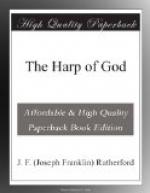[247]The prophet Job pointed to the time of redemption and deliverance when he said: “For I know that my redeemer liveth, and that he shall stand at the latter day upon the earth”. (Job 19:25) If the Redeemer was to stand at the latter day upon the earth, then he must arise from the dead after he had provided the redemptive price by his death; hence this Scripture must foreshadow his resurrection. The psalmist David wrote prophetically concerning Jesus’ resurrection when he said: “For thou wilt not leave my soul in hell; neither wilt thou suffer thine Holy One to see corruption. Thou wilt show me the path of life: in thy presence is fullness of joy; at thy right hand are pleasures for evermore.” (Psalm 16:10,11) We have the inspired testimony of the Apostle that the Prophet did there refer to the resurrection of Jesus.—Acts 2:27-31; 13:35-37.
[248]Again the prophet David wrote concerning Jesus, the Savior of the world: “As for me, I will behold thy face in righteousness: I shall be satisfied, when I awake, with thy likeness”. (Psalm 17:15) The awakening clearly means the awakening out of death. Jesus was awakened out of death in the express image of the Father. (Hebrews 1:2) Again the Psalmist wrote: “Thou hast ascended on high, thou hast led captivity captive: thou hast received gifts for men”. (Psalm 68:18) Clearly the apostle Paul refers to this same Scripture in Ephesians 4:8, showing that the Psalmist referred to the resurrection of Jesus.
[249]The prophet Isaiah wrote: “For unto us a child is born, unto us a son is given: and the government shall be upon his shoulder: and his name shall be called Wonderful, Counsellor, The mighty God, The everlasting Father, The Prince of Peace. Of the increase of his government and peace there shall be no end, upon the throne of David, and upon his kingdom, to order it, and to establish it with judgment and with justice from henceforth for ever.” (Isaiah 9:6,7) Here it is clearly stated that the One who would hold this exalted position, the Messiah, is to be the everlasting Father. Father means life-giver, and it would be impossible for Jesus to be the great Life-giver to man unless he was raised from the dead.
[250]Again the prophet Isaiah described the sufferings of Jesus and his death and subsequent resurrection when he wrote: “The Lord hath laid on him the iniquity of us all.... He is brought as a lamb to the slaughter.... He was taken from prison and from judgment: ... He was cut off out of the land of the living: for the transgression of my people was he stricken. And he made his grave with the wicked, and with the rich in his death: ... when thou shalt make his soul an offering for sin, he shall see his seed.... He shall see of the travail of his soul and shall be satisfied: by his knowledge shall my righteous servant justify many.” (Isaiah 53:6-11) He could not have poured out his soul unto death and afterward see the travail of his soul and be satisfied unless he should be raised from the dead.




